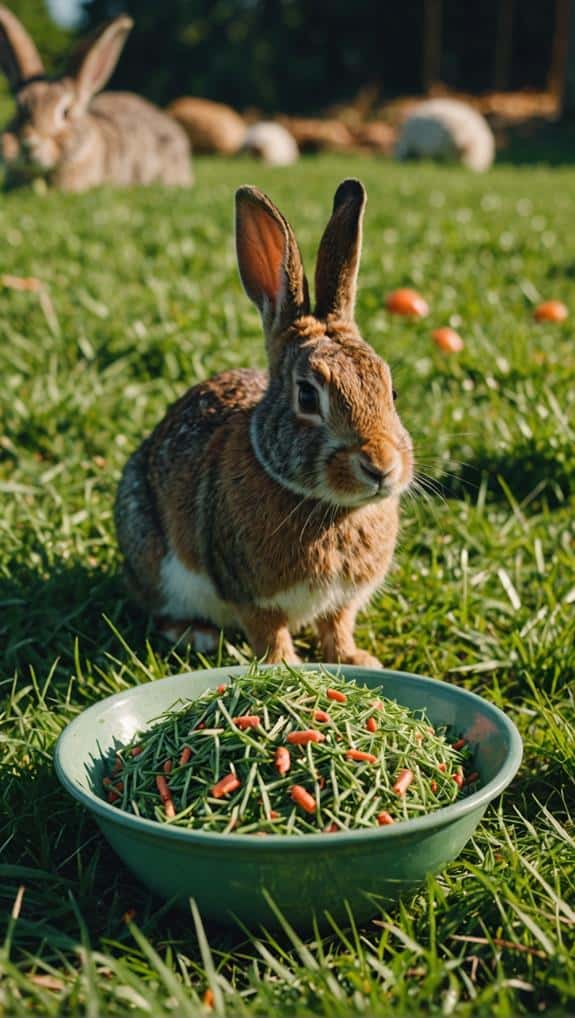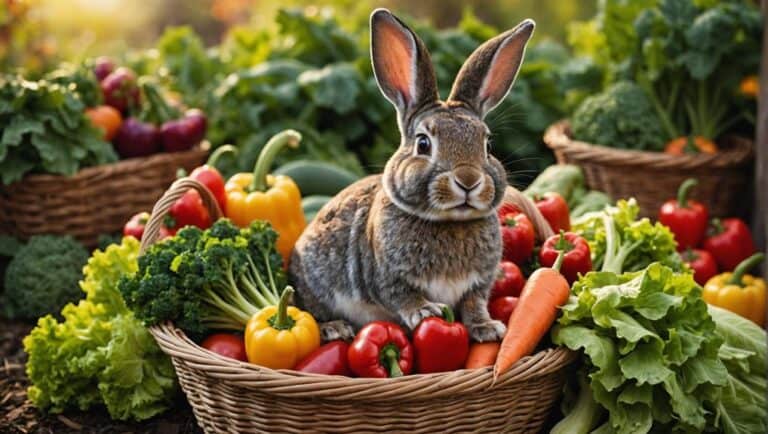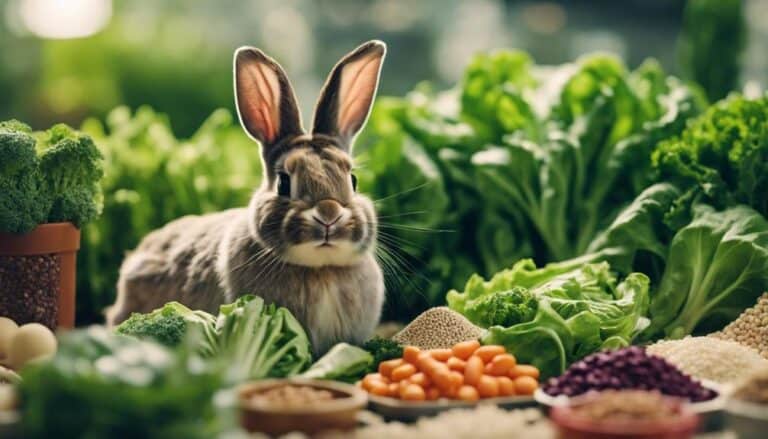When you think about what's nutritionally better for your rabbit—rabbit pellets or Timothy hay—it's essential to reflect on their unique roles in a balanced diet. Timothy hay is packed with fiber, which supports healthy digestion and keeps those teeth in check. On the other hand, rabbit pellets can provide necessary vitamins and minerals but should be given in moderation to avoid obesity. So, how do you strike the right balance between these two options to guarantee your rabbit thrives? The answer may surprise you as we explore their nutritional intricacies.
Contents
Nutritional Value of Timothy Hay

Timothy hay stands out as an important dietary component for adult rabbits, primarily because of its impressive nutritional profile. Comprising 80-90% of an adult rabbit's diet, this hay is rich in fiber, containing approximately 29-33% fiber, which promotes healthy digestion and dental health. The high fiber content helps wear down your rabbit's continuously growing teeth, supporting proper gastrointestinal function and preventing dental issues down the line.
Moreover, Timothy hay is low in protein and calcium, which is vital for adult rabbits. This nutrient balance reduces the risk of obesity and urinary tract problems, fostering long-term health.
You’ll find different cuts of Timothy hay—coarse, medium, and soft—catering to your rabbit’s chewing preferences and abilities. This variety not only guarantees that your rabbit enjoys its meals but also encourages natural foraging behaviors, alleviating boredom and preventing destructive chewing habits. Offering a selection of hay cuts is especially beneficial when considering the differences in chewing habits between tame rabbits vs wild rabbits. Tame rabbits may require softer options as they are often more accustomed to human care, while wild rabbits typically forage for coarser varieties in their natural habitats. By providing these different cuts, you can ensure that both types of rabbits receive the necessary texture and nutrients, promoting healthy digestion and dental health.
Incorporating Timothy hay into your adult rabbit's diet offers essential nutrients while promoting overall well-being. By prioritizing this hay, you're investing in your pet's health and happiness, allowing them to thrive in their environment.
Benefits of Rabbit Pellets
Rabbit pellets offer balanced nutritional support that can fill gaps in your rabbit's diet, ensuring they get essential vitamins and minerals.
These pellets are particularly beneficial for managing fiber intake, which is vital for preventing obesity and promoting healthy digestion a balanced bunny diet.
By providing measured portions, you can effectively manage your rabbit's weight while still meeting their dietary needs.
Additionally, these pellets can supplement any deficiencies that may arise from a hay-only diet, particularly for young, growing, or ill rabbits.
Balanced Nutritional Support
Providing balanced nutritional support is crucial for maintaining your rabbit's health, and rabbit pellets play a critical role in achieving this goal. Unlike hay, which primarily offers fiber, pellets deliver important vitamins, minerals, and nutrients that may not be fully present in hay. This is particularly important for young or ill rabbits, who may require unlimited access to pellets for ideal growth and recovery.
Additionally, pellets can help prevent nutrient deficiencies, which are essential for overall health and energy levels, as emphasized in the importance of diet in overall health.
Quality rabbit pellets should contain at least 18% fiber and be low in protein to prevent obesity and gastrointestinal issues in adult rabbits. By incorporating pellets into your rabbit's diet, you can guarantee they receive balanced nutrition while still encouraging hay consumption as their primary forage.
The measured serving sizes—typically around ¼ to ½ cup daily for rabbits weighing 5 to 7 pounds—help maintain a healthy weight and promote proper digestive health.
Furthermore, using pellets strategically can enhance your rabbit's overall diet. By providing a nutrient boost, you support their well-being while maintaining the essential fiber that hay provides. In this way, rabbit pellets complement hay, creating a balanced approach to your rabbit's nutritional needs.
Portion Control Benefits
Portion control plays a critical role in managing your rabbit's diet, especially when incorporating pellets. By providing a measured serving size, you can help your rabbit maintain a healthy weight while guaranteeing balanced nutrition.
It's important to remember that Timothy hay is crucial for rabbit health due to its high fiber content, which complements the nutrients found in pellets.
Here are some key benefits of portion control with rabbit pellets:
- Prevents Overeating: Recommended servings of ¼ to ½ cup for rabbits weighing 5 to 7 pounds help avoid obesity.
- Balanced Nutrition: Controlled portions guarantee your rabbit gets the right nutrients without exceeding caloric intake, which is essential for overall health.
- Encourages Hay Consumption: By limiting pellets, your rabbit will naturally consume more hay, important for dental health and preventing gastrointestinal stasis.
- Tailored to Individual Needs: Regularly monitoring and adjusting pellet portions based on your rabbit's health can help sustain ideal weight and prevent dietary issues.
Incorporating these portion control strategies not only supports your rabbit's diet but also complements the high-fiber benefits of hay.
This balanced approach guarantees your rabbit remains healthy and happy, allowing you to provide the best care possible.
Supplementing Dietary Deficiencies
Incorporating rabbit pellets into your pet's diet can effectively address potential nutritional deficiencies that hay alone mightn't fulfill. While hay is high in fiber, it may lack certain essential vitamins and minerals important for your rabbit's health. Quality rabbit pellets are formulated to provide a balanced source of nutrients, offering at least 18% fiber to complement hay's high fiber content and support digestive health.
Moreover, these pellets supply essential protein and energy, particularly important for young rabbits or those recovering from illness. This targeted nutrition caters to your rabbit's specific dietary needs, ensuring they thrive.
Measured servings of rabbit pellets help prevent overconsumption, which is a common issue with free-choice hay feeding. This approach reduces the risk of obesity in adult rabbits while still addressing potential nutritional gaps.
Regularly feeding pellets alongside hay can lead to a well-rounded diet, greatly minimizing the risks of deficiencies and promoting overall health in rabbits. By thoughtfully integrating rabbit pellets into your pet's meals, you can enhance their nutritional intake and support their long-term well-being.
Role of Fiber in Rabbit Diet

How essential is fiber in a rabbit's diet? Fiber plays a pivotal role in maintaining your rabbit's health, particularly for digestion. When you incorporate high-fiber options like Timothy Hay—comprising 30% or more fiber—you're ensuring your rabbit thrives.
Here are four key benefits of fiber in their diet:
- Digestive Health: Adequate fiber helps prevent gastrointestinal stasis and blockages, vital for a rabbit's well-being.
- Dental Care: The abrasive texture of hay naturally wears down your rabbit's continuously growing teeth, reducing dental issues.
- Natural Behaviors: High-fiber diets encourage foraging and chewing, keeping your rabbit mentally stimulated and engaged.
- Weight Management: A fiber-rich diet prevents obesity, a common risk associated with excessive pellet consumption.
Comparing Calcium Levels
Calcium levels in a rabbit's diet considerably impact their overall health, especially concerning urinary tract issues.
When comparing calcium content, Timothy Hay emerges as a more suitable option for adult rabbits. Typically containing around 0.9% calcium, it helps maintain a balanced intake, reducing the risk of urinary stone formation.
In contrast, alfalfa hay is much higher in calcium, with levels ranging from 1.2% to 2.2%. While this makes it a favorable choice for young, growing rabbits, excessive calcium intake in adults can lead to complications like urinary sludge.
This condition can result in painful urinary stones, putting your rabbit at risk for serious health issues.
Importance of Portion Control

Understanding portion control is crucial for your rabbit's health and well-being.
By measuring pellet servings, you can prevent overeating and obesity while ensuring a balanced diet that emphasizes hay for essential fiber and dental health.
This approach not only promotes healthy habits but also aligns with their nutritional needs, keeping your rabbit happy and thriving.
Preventing Overeating Risks
Portion control is essential when it comes to preventing overeating in rabbits, as excessive intake of pellets can lead to serious health issues. To maintain your rabbit's health, it's important to guarantee that their diet is balanced.
Here are some tips to help you manage portion sizes effectively:
- Limit Pellets: For rabbits weighing 5 to 7 pounds, aim for ¼ to ½ cup of pellets per day to avoid excessive calorie intake.
- Prioritize Hay: Timothy hay should make up 80-90% of your rabbit's diet, providing critical fiber for proper digestion.
- Monitor Weight: Regularly check your rabbit's weight and adjust pellet portions as needed to prevent obesity and maintain health.
- Watch for GI Issues: Be alert for any gastrointestinal problems, as high pellet consumption can lead to serious digestive issues.
Balancing Nutritional Needs
Finding the right balance in your rabbit's diet is vital to their overall health and well-being. An important aspect of this balance is portion control, particularly with rabbit pellets. For adult rabbits weighing 5 to 7 pounds, the recommended serving size is ¼ to ½ cup of pellets daily. Overeating these calorie-dense pellets can lead to obesity and serious health issues like gastrointestinal stasis.
While hay, such as timothy, should constitute 80-90% of your rabbit's diet, providing unlimited access encourages natural foraging behaviors and guarantees they receive the necessary fiber.
Hay plays an indispensable role in promoting digestive health, making it the primary component of their diet.
Promoting Healthy Habits
Many rabbit owners overlook the importance of portion control in their pets' diets, yet it's essential for maintaining a healthy weight and preventing obesity. Proper management of your rabbit's diet not only fosters a balanced nutritional intake but also encourages healthy habits.
Here are some key points to keep in mind:
- Measure Pellets: Limit serving sizes to ¼ to ½ cup of pellets for rabbits weighing 5 to 7 pounds.
- Unlimited Hay Access: Provide constant access to hay, which supports natural foraging behaviors and guarantees fiber intake.
- Monitor Health: Regularly check your rabbit's weight and adjust portions as needed to optimize health.
- Encourage Hay Consumption: Gradually reducing pellet availability prompts rabbits to seek out hay, preventing potential gastrointestinal issues.
Transitioning Between Hays
As your rabbit approaches seven months of age, shifting from Alfalfa Hay to Timothy Hay becomes fundamental for their health and development. This alteration helps prevent obesity and guarantees that your rabbit receives the lower protein and calcium levels found in grass hay like Timothy.
To facilitate this process, gradually mix Timothy Hay with Alfalfa Hay over several weeks. This allows your bunny to adjust to the new taste and texture while encouraging hay consumption.
Monitoring your rabbit's eating habits during this change is essential. If they resist Timothy Hay, it may indicate that you need to take a more gradual approach or introduce softer hay varieties initially.
Providing a constant supply of quality Timothy Hay is crucial, as it should make up 80-90% of an adult rabbit's diet. This guarantees they receive the necessary fiber for peak dental and digestive health.
The texture and fiber content of Timothy Hay support proper digestion and promote important chewing behaviors.
These behaviors are particularly significant as your rabbit shifts, helping maintain their dental health while adapting to a new dietary staple.
Overall Dietary Recommendations

Ensuring your rabbit receives a balanced diet is essential for their overall health and longevity. A well-rounded diet should primarily focus on unlimited hay, complemented by pellets and fresh vegetables.
Here are some dietary recommendations to follow:
- Hay: Make hay (preferably Timothy hay) 80-90% of your rabbit's diet. Its high fiber content promotes good digestion and dental health.
- Pellets: Offer high-fiber pellets (≥18%) in moderation. These should serve as nutritional supplements, not the main diet component.
- Portion Control: Limit pellet intake to ¼ to ½ cup per day for rabbits weighing 5 to 7 pounds to avoid obesity and related health issues.
- Vegetables: Introduce a variety of fresh, safe vegetables to provide additional nutrients. Always wash them thoroughly and introduce new ones gradually.
Regularly monitoring your rabbit's weight and overall health is imperative. This practice allows for necessary dietary adjustments, ensuring a nutritionally balanced diet.
Final Thoughts
In conclusion, while rabbit pellets can offer essential nutrients, Timothy hay should dominate your rabbit's diet, comprising 80-90% of their intake. This hay's high fiber content not only aids digestion but also helps prevent dental issues, which affect 70% of rabbits by age three. Prioritizing Timothy hay guarantees your furry friend remains healthy and happy, while pellets should only serve as a minor supplement. Balancing these elements is key to your rabbit's overall well-being.






